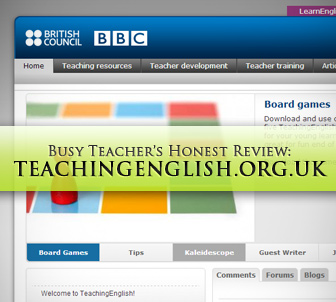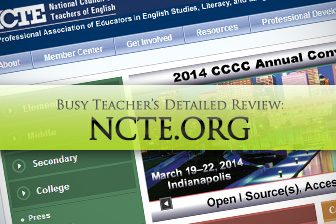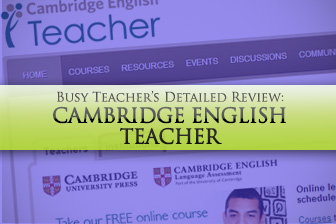Teachingenglish.org.uk: BusyTeacher's Detailed Review


The National Council of English Teachers is an important organization “devoted to improving the teaching and learning of English and the language art at all levels of education.” Here is there Mission Statement as it is displayed on the site: “The Council promotes the development of literacy, the use of language to construct personal and public worlds and to achieve full participation in society, through the learning and teaching of English and the related arts and sciences of language.” This mission is certainly all encompassing, and without a doubt, encouraging the field of Teaching English as a Second or a Foreign Language would fall under their goals, but this is certainly not a main focus of the organization. It’s important to keep this in mind when visiting the site; it’s not intended for ESL or EFL. That said, some of the content on the website may be of use to teachers of English domestically or abroad, but others may want to take a pass.
Here’s what the site has to say about English Language Learners in particular.
“NCTE recognizes bilingual and bicultural education as basic components of the ELA field. Teachers of English in bilingual settings should have professional preparation, if not certification, in the field. NCTE encourages teachers of English to cooperate with colleagues in bilingual education programs. It encourages teachers with only a few non-English-speaking students to become familiar with bilingual education aims and methods and to draw upon ESL literature for help in meeting the needs of those students. NCTE assumes the responsibility, on both the national and the affiliate levels, of working with other organizations involved with bilingual education and especially with teaching English to speakers of other languages.”
NCTE has a number of initiatives in place specifically for teaching ELL’s. Most of these seem to be tailored towards those working with ELL’s in the American K-12 Public school system.
The Pathways Program is “an online professional development opportunity for teachers, coaches, and administrators.” It is intended to aid in the development of understanding and skills necessary for working with English Language Learners. “Essential questions, video clips, related readings and tools for classroom application” are available to help professionals navigate their work with English Language Learners.
Web Seminars are offered in a number of areas, one of which is specifically working with ELL’s. These are professional development opportunities that focus on practical suggestions for teachers who are focused on student-centered teaching to incorporate appropriate methodology into their classrooms. Content does address the Common Core State Standards, so again, this is a resource intended for U.S. K-12 teachers. Webinars can be viewed live, and archives are available for a fee.
Content on the site is divided into the following categories: Elementary, Middle, Secondary, and College. There’s something for instructors at all levels. There is a link posted to instructional lessons and materials but direct content on the site does not include materials, lesson, or practice opportunities that students can be directed to. On the linked site, there are resources classified by grade level, learning objective, lesson type, and theme. This may be a site worth exploring in the future if teachers are looking for a new database of resources.
For this interested in career advancement and job placement, there is a section devoted to a Newsletter, Hot Topics, grants, job postings at http://www.ncte.org/career. Users can search by state or type of job. These postings are not ESL-specific, but certainly, there are available domestic jobs posted for bilingual and ESL teachers in the U.S.

The National Council of Teaching English is a well-respected organization with a number of resources. It’s important that any teachers involved with the teaching of English, in any capacity, familiarize themselves with this body. It’s certainly worth exploring their extensive website, but in terms of real, practical ESL or EFL content, this probably is not the ideal site to spend one’s time visiting.

This site is meant for use by mainstream, K-12 classroom English teachers in the U.S. As a result, the materials are intended for ESL teachers working in very specific contexts. This is place to come for information about policy and large-scale happening in the world of education, but its not a place to get specific information about the field of Teaching English as a Second Language, and certainly not Teaching English as a Foreign Language.
For those who are teaching in the United States at the K-12 level, there may be some informative content on this site. However, this is not the place to seek easy teaching preparation or ideas for lessons. Instead, it is a place to find resources on broader issues in teaching, many of them of a political nature. The site links to a resource with materials and lessons available, but even those are not specifically intended for use the English as a Second Language classroom. There are other Online resources that are provided in service to this.
However, it is likely not be of much use for English as a Foreign Language teachers in classrooms abroad, and will be relevant to a limited ESL audience domestically. On the other hand, those who wish to discover information about educational policy or the Common Core Standards as they relate to the teaching of English in U.S. K-12 classrooms, this is a good place to spend some time. For the rest of us who are focused on higher education or teaching English in other countries, there are better sites for our purposes. Have any K-12 teachers gotten involved with the professional development opportunities through the NCTE?
This is a guest review by an independent author. This review reflects the opinions of the author and not necessarily those of BusyTeacher.org as a publication.

![AE [American English]: BusyTeacher's Detailed Review](/uploads/posts/2013-05/1368762544_ae.jpg)
